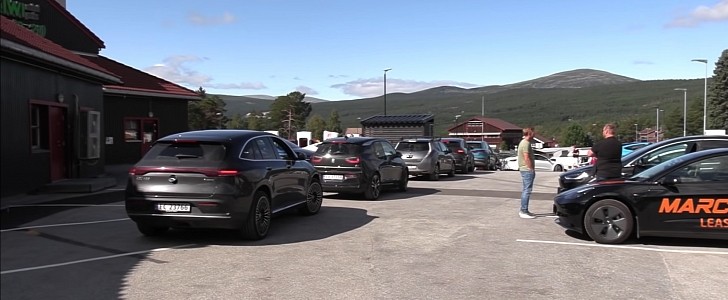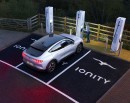While it's stamped and sealed that electric vehicles are the future, owning an electric vehicle still feels unusual. The UK has set a ban on gas engines for 2030, but there's still a massive demand for charging infrastructure, especially for EV owners without a private garage or driveway.
While electric cars are still much more expensive than the average gas-powered vehicle, they are a breeze to own, saving a fortune in maintenance costs. The transition is both an environmentalist's and a motorist's dream.
According to UNEP, the global transportation sector accounts for a quarter of the world's carbon emissions, road-going vehicles accounting for about three-quarters of that share.
But there's a problem. EVs are already facing huge hurdles transitioning into the primary means of road transportation. The industry is already suffering from a massive chip shortage, and there's also a pressing need for better battery technology.
However, the biggest hurdle and perhaps the most crucial concern that could stagnate the electric vehicle revolution is charging infrastructure. Electric vehicles might be good for the environment, saving our already ailing planet, but are we ready for this rapid shift?
Ben Bergman, a Startups Correspondent at Business Insider, confirmed these fears through a tweet to Elon Musk Sunday evening, saying, "the very rare times as a Tesla owner I wish I could pay $6/gallon for gas and be on my way. We need more superchargers @elonmusk."
Musk responded to the tweet seven hours later, saying, "Working on it."
There's no doubt that the number of charging stations will quadruple tenfold in a short time. Many governments in the world are already working on that. The main concern is, are they expanding as fast as the demand for electric vehicles?
According to Forbes, the number of EVs in the U.S. could rise to 35 million by 2030. This necessitates the construction of 1.5 million charging ports to support the rise. While many governments worldwide encourage the use of EVs to reduce carbon emissions for climate action, ensuring adequate infrastructure is still a challenge.
In the UK, lobby groups are citing disparity in charging point distribution. SMMT (Society of Motor Manufacturers and Traders) feels charging infrastructure is not growing fast enough to meet the ever-increasing number of electric vehicles in the country.
While charging points in the UK grew by 82% between 2019 and 2021, electric vehicles increased by 600% in the same period.
The trade association also feels the car industry in the region is experiencing the unequal provision of electric vehicle charging points. The South of England has considerably more charging points than the North.
The U.S. suffers the same predicament since the number of charging point vary from state to state. In North Dakota and Wyoming it is 1:2 EVs, while in New Jersey, it is 1:18. EV drivers in later states in the U.S., or regions like North England are more likely to wait in line or less likely to get EVs altogether.
According to UNEP, the global transportation sector accounts for a quarter of the world's carbon emissions, road-going vehicles accounting for about three-quarters of that share.
But there's a problem. EVs are already facing huge hurdles transitioning into the primary means of road transportation. The industry is already suffering from a massive chip shortage, and there's also a pressing need for better battery technology.
However, the biggest hurdle and perhaps the most crucial concern that could stagnate the electric vehicle revolution is charging infrastructure. Electric vehicles might be good for the environment, saving our already ailing planet, but are we ready for this rapid shift?
Ben Bergman, a Startups Correspondent at Business Insider, confirmed these fears through a tweet to Elon Musk Sunday evening, saying, "the very rare times as a Tesla owner I wish I could pay $6/gallon for gas and be on my way. We need more superchargers @elonmusk."
Musk responded to the tweet seven hours later, saying, "Working on it."
There's no doubt that the number of charging stations will quadruple tenfold in a short time. Many governments in the world are already working on that. The main concern is, are they expanding as fast as the demand for electric vehicles?
According to Forbes, the number of EVs in the U.S. could rise to 35 million by 2030. This necessitates the construction of 1.5 million charging ports to support the rise. While many governments worldwide encourage the use of EVs to reduce carbon emissions for climate action, ensuring adequate infrastructure is still a challenge.
In the UK, lobby groups are citing disparity in charging point distribution. SMMT (Society of Motor Manufacturers and Traders) feels charging infrastructure is not growing fast enough to meet the ever-increasing number of electric vehicles in the country.
While charging points in the UK grew by 82% between 2019 and 2021, electric vehicles increased by 600% in the same period.
The trade association also feels the car industry in the region is experiencing the unequal provision of electric vehicle charging points. The South of England has considerably more charging points than the North.
The U.S. suffers the same predicament since the number of charging point vary from state to state. In North Dakota and Wyoming it is 1:2 EVs, while in New Jersey, it is 1:18. EV drivers in later states in the U.S., or regions like North England are more likely to wait in line or less likely to get EVs altogether.
The very rare time as a Tesla owner I wish I could pay $6/gallon for gas and be on my way. We need more super chargers @elonmusk pic.twitter.com/qmxbghkycO
— Ben Bergman (@thebenbergman) March 20, 2022








